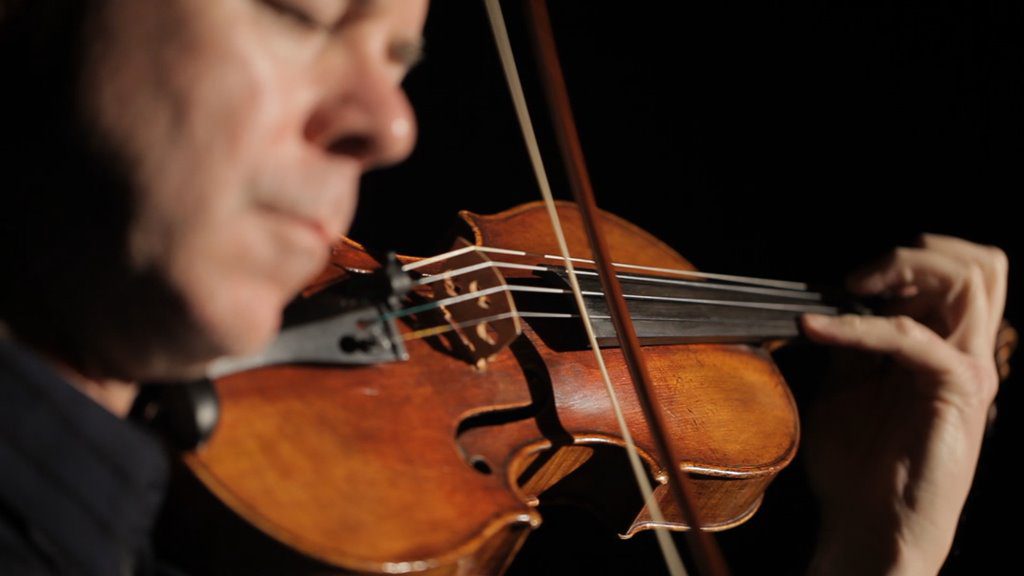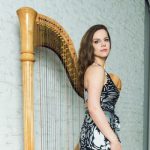Glories of the Harp
Frankly Music presents beautiful works featuring MSO harpist Kelsey Molinari.

Frank Almond playing the Lipinski Stradivarius violin. Image from Milwaukee Film Festival.
For the first time, a Frankly Music series concert, coming this Monday at Wisconsin Lutheran College, will spotlight the harp. Kelsey Molinari, who has served as harpist with the Milwaukee Symphony Orchestra this season, will participate in all the selections in the first half of the concert.
To conclude, pianist Marta Aznavoorian and cellist Alexander Hersh will join violinist and Artistic Director Frank Almond for a more traditional chamber classic – a trio by Robert Schumann.
Aznavoorian, a founding member of the distinguished Lincoln Trio and faculty member at DePaul University, appears for the first time. “I have wanted her to be on the series,” Almond comments. “It just takes time.”
Hersch, not so many years removed from graduate work, already keeps an active guest artist schedule balanced between symphony and chamber concerts. He has appeared in the Frankly Music series in the past. Hersch “has a great career ahead of him,” Almond recognizes, “I’m happy to get him here while I still can.”

Kelsey Molinari
Molinari will open with a harp solo by Carlos Salzedo (1885-1961), Chanson dans la Nuit. The unique character of the harp has meant that composers specializing in the instrument have contributed most to the harp repertoire. Salzedo founded a popular summer colony for harpists in Camden, Maine. Harpists find his texts and compositions a key resource. An impressionistic work, Chanson dans la Nuit introduces features unique to the instrument.
Almond will join Molinari for a Fantaisie for violin and harp, Op. 124 by Camille Saint-Säens. Saint-Säens deftly explores the distinct differences between the sustained sounds of bowing strings and the fleeting character of a harpist’s plucked strings. Saint-Säens was “an absolute expert at exploiting the quality of each instrument,” Almond observes. “Incredibly prolific, he was worshiped during his lifetime. He played all over Europe. (But he was) a 19th-century composer who lived into the 20th century.” Attention shifted to more contemporary styles so that many of his works are little known today.
Critic Barbara Leish describes the Fantaisie as an “inventive, atmospheric work – which is filled with flowing melodies and bravura turns for both instrumentalists. The violin and the harp engage each other in an ever-changing pas de deux. … Throughout, there’s a silky smoothness to Saint-Saëns’s touch as he leads his duo from calm, through playfulness, whimsy, and passion, back to calm with a return to the balance and clarity of the opening.”
Almond and Molinari will also play an arrangement for violin and harp of one of the most popular works by Ralph Vaughan-Williams — The Lark Ascending. A virtuoso work for violin and orchestra, this arrangement replaces the orchestra with harp, adapting a version that Vaughan-Williams had written for violin and piano. The chamber work is, appropriately, airer than the original. Both violin and harp soar, recalling the poem by George Meredith that inspired Vaughan-Williams:
He rises and begins to round …
As up he wings the spiral stair,
A song of light, and pierces air
With fountain ardor, fountain play,
To reach the shining tops of day
Yet this is not a ode to nature, but a tribute to the fallen of World War I
Yet men have we, whom we revere,
Now names, and men still housing here,
Whose lives, by many a battle-dint
Defaced, and grinding wheels on flint,
Yield substance, though they sing not, sweet
For song our highest heaven to greet: …
In them, that song aloft maintains,
To fill the sky and thrill the plains.
Almond imagines a likely connection between the Schumann Trio and his Lipinsky violin. The premiere of the work was a private concert in Dresden for Clara Schumann‘s 48th birthday. Karol Lipinsky, a close friend of the Schumann’s was in Dresden at the time. He was known to have played the trio at public concerts with Clara Schumann. We have “no videos of them playing this,” says Almond. But he finds the connection to the premiere “plausible.”
This concert offers an opportunity to appreciate the harp as a solo and chamber instrument. The showcases for harp also include extraordinary virtuoso turns for the violin as well. Almond has curated another extraordinary concert.
The concert begins at 7:00 p.m. next Monday, January 27 at Wisconsin Lutheran College’s Schwann Concert Hall – located at 8800 W Bluemound Rd, Milwaukee. Reserved seat tickets ($35) may be purchased at the door or in advance through the Frankly Music website or through the Wisconsin Lutheran College box office: 414-443-8802. Student tickets are available for $10.
The final concert in the series, March 16th at Wisconsin Lutheran College will showcase musicians of the Milwaukee Symphony Orchestra. The varied, intriguing program includes Darius Milhaud‘s La cheminée du roi René, and Joaquin Turina‘s The Prayer of the Bullfighter, alongside W.A. Mozart‘s playful Horn Quintet and Louis Spohr‘s captivating Nonet.
If you think stories like this are important, become a member of Urban Milwaukee and help support real, independent journalism. Plus you get some cool added benefits.




















